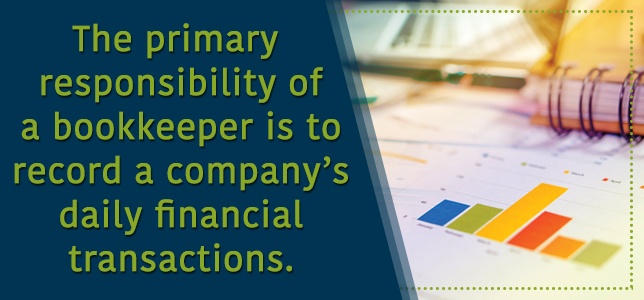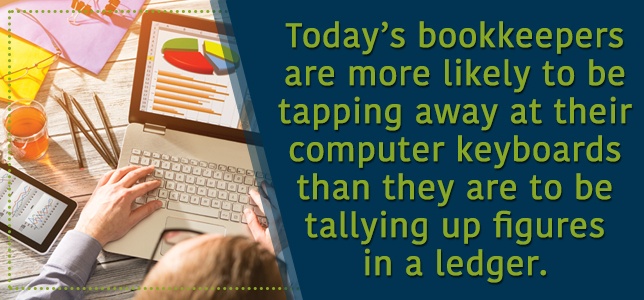What is a Bookkeeper?

In a nutshell, bookkeepers are those who manage the financial records of a company so the company’s bills are paid and the revenue is recorded. The bookkeeper also ensures employees are paid when they should be, and invoices are sent out in a timely fashion.
But a bookkeeper is more than someone who tallies up the numbers. Bookkeepers provide a vital business function that helps companies manage their cash flow, report on their earnings and ensure the business runs smoothly.
The Bureau of Labor Statistics states that bookkeepers earn $37,250 per year, on average. While the majority work full time, approximately one in four work part time, making it an ideal job for someone returning to school, parenting their children or caring for elderly parents.
If you run a business, a staff bookkeeper can be a great asset to your company. However, businesses today also have many other options when it comes to bookkeepers. For instance, outsourcing your bookkeeping is now easier than ever. Outsourced bookkeeping can be both cost and time effective, too, providing you with great bookkeeping services without adding another employee to your payroll.
Before diving into what your company needs, let us take a closer look at the role of the bookkeeper within small to mid-sized organizations.
What Does a Bookkeeper Do?

The primary responsibility of a bookkeeper is to record a company’s daily financial transactions. Depending on the company, this may include:
- Recording Sales: Bookkeepers track daily sales. They may do this manually using an accounting ledger or, more likely, with a computer program such as QuickBooks. Some businesses have relatively few transactions per day, but others, such as retail businesses and restaurants, may have dozens or hundreds of transactions. Entries can be entered manually. Or automatically, if your POS system feeds accurate information into your accounting software. You can also find an application to help import information into QuickBooks. The system must be audited and reviewed frequently to ensure accuracy as well.
- Managing Payroll: Payroll duties are not as simple as issuing checks to employees. They may include setting up employee direct deposits, issuing payroll checks, establishing accounts within the state and federal employment and taxation systems as well as and paying taxes, healthcare insurance premiums, social security and Medicare taxes when due.
- Invoicing: In addition to paying bills, bookkeepers may also issue customer invoices.
- Verifying Invoices (Vendor Bills): Bookkeepers also reconcile bills and purchases from suppliers with purchase orders and other documentation. This ensures orders match approved budgets and purchases.
- Paying Bills: Managing and paying bills from vendors is also called Accounts Payable. Most bookkeepers handle a company’s accounts payable process. They must keep track of which vendors must be paid and on what terms. They must also manage vendor credit.
- Conducting Credit Checks: If the company issues lines of credit to customers, many bookkeepers perform basic due diligence on the company prior to gaining management approval on lines of credit.
- Running Reports: Bookkeepers must be able to use their accounting software to run reports on the company’s finances. These reports help the owners or managers track expenses versus income, customer income and other financial benchmarks that are critical to the health of the company.
- Providing Budgeting Assistance: The bookkeeper may be asked to help manage expenses against a budget and alert staff when budget limits are reached.
- Managing Account Reconciliation: Both credit cards and bank accounts must be reconciled each month to ensure debits match credits — or that every purchase and deposit is accounted for within the system. You should also reconcile loans and lines of credit or any account that receives a statement with a beginning and ending balance.
- Tracking and Paying Sales Tax: Bookkeepers may track and pay the company’s sales tax. Bookkeepers must keep on top of items exempt from taxation, tax-free days in the state and which taxes are owed. They may also keep track of nexus, which means the locations of the business entity and related branches.
Sales tax is based on the nexus, or where a business is located, but it can get complicated if the business has a warehouse or full-time staff in other states. Bookkeepers must understand nexus laws and help companies comply with all sales tax laws.
Bookkeeping in the Computer Age

If you imagine bookkeepers hunched over dusty old ledgers, think again. Today’s bookkeepers are more likely to be tapping away at their computer keyboards than they are to be tallying up figures in a ledger.
Many small businesses use QuickBooks online, an accounting software package that includes basic accounting functions to manage invoices, estimates, sales, credit card and checkbook reconciliation. Bookkeepers today often set up the general ledger and related accounts in QuickBooks to establish a logical bookkeeping system for their clients.
QuickBooks is very user-friendly and can be accessed through a simple, visual dashboard or through the general ledger. Depending on how comfortable the bookkeeper is with the double entry system of bookkeeping, they may choose to work directly from the general ledger or use the simple interface.
Cloud Accounting
Some companies today use cloud accounting packages. Such systems also enable bookkeepers to track expenses and payments but have broader functions that may include warehouse and inventory management, supply chain management and other functions.
Cloud accounting simply means that the software and data are housed on the cloud, a shared server accessed through an Internet connection. Cloud systems function just like software located on a terminal in the office. QuickBooks online, Xero and similar accounting software packages are all examples of cloud accounting.
Financial Reporting
Bookkeepers are also adept at financial reporting. Financial reports provide either a top-level or a detailed overview of a company’s transactions. These may be required on a monthly, quarterly or annual basis.
Although bookkeepers do not prepare taxes or conduct audits, they may provide financial reports that enable others to complete these tasks. Bookkeepers understand systems and are experts at organizing data.
Budgeting and Forecasting

Bookkeepers are often part of the senior management team that determines the company’s budget and forecast projections. They can help the company establish a realistic budget based on past performance, current industry information and current cash flow. They can also help forecast future income and expenses based on history.
Budgeting and forecasting can be tricky for companies with seasonal highs and lows. Understanding the specific business cycles of a seasonal company such as a garden center, lawn care company, snow plow service or Christmas shop can also be an important benefit of working with a bookkeeper on budgeting and forecasting. When a company’s revenues tend to arrive all in one quarter or season, having someone on hand who understands how to budget for lean times and ensure continuous cash flow is critical.
CFO Services
The CFO of a company is the Chief Financial Officer. CFOs are responsible for the company’s cash flow and for reconciling all the accounts. They lead financial planning, investment, compliance with tax laws and many other services related to the finances of the company.
Bookkeepers do many of the same things, especially in smaller companies. A local hair salon, nail salon, dance studio or pottery studio may not have the need for a CFO, but a good bookkeeper can function as one. They may provide valuable insights and information to help the owners of such small businesses make sound decisions for long-term business financial stability.
Business Consulting
Bookkeepers are so much more than number crunchers and bean counters. Because of their deep knowledge of a company’s finances, they can also act as business coaches, consultants and advisors.
Bookkeepers can help you with many areas of your business that rely upon steady cash flow for growth. Bookkeepers as consultants can help you analyze your financials to determine many things including:
- Payroll Size: Can you afford to hire someone full time or part time, or is it better to find a freelancer or an independent contractor?
- Business Locations: What is the projected revenue at location A compared to location B? A bookkeeper skilled at business consulting can help you determine potential revenues based on past performance.
- Expansion: Because bookkeepers can analyze past financial history, they can help you decide whether it is time to expand or not.
- Budgeting: A budget offers guidance on how much you can spend to achieve your business objectives. Understanding your budget and having a skilled consultant help you create and build a budget, can prove useful in getting your business onto a sound foundation.
Hiring a Bookkeeper vs. Handling the Accounts Yourself
Some business owners, in a quest to save money, attempt to handle their books themselves. They may purchase a software package or cloud-based accounting service with the hopes of maintaining their own books.
Problems, however, arise with a lack of time and experience. Bookkeeping is a skilled profession that requires training to properly handle a company’s accounts. Without this training, you may make rookie mistakes that can cost your company time, money in the form of penalties and taxes as well as customer good will.
For example, if you do not understand how to file your payroll taxes, you could face steep fines. If you do not understand the importance of following up on your open receivables, you could end up with poor cash flow and too many open invoices with your customers.
Consider how much your time is worth. Would your time be better spent on your business or handling the books? Even time after your business closes for the day could be better spent on other tasks related either to your business or to refresh yourself with personal time than sitting down to handle your books.
Specific accounting tasks must be handled monthly, or they will build up and cause problems over time. Reconciling credit card statements monthly ensures erroneous or fraudulent charges are identified and addressed promptly. Updating bank statements in your accounting programs leads to more accurate budgeting, forecasting and financial records. These can be handled more efficiently by a bookkeeper than by the average business owner.
As a business owner, you wear many hats. You probably manage your daily business operations, provide the goods or services you sell, and act as marketing and sales manager. Bookkeeping, however, is one task you can safely delegate to a professional.
Outsourced Bookkeeping

If you have decided to add a bookkeeper to your business, you have several options. You can hire a full-time bookkeeper, but that adds a considerable expense to your business as a full-time salary, plus benefits and taxes. A part-time employee also adds a similar expense, so outsourcing may be a less expensive alternative.
Outsourced bookkeeping services offer the best of all possible worlds to the business owner. You can work with an experienced bookkeeper without adding payroll to your overhead. Such a bookkeeper probably has many years of experience, which can help you run your business better.
Another benefit is that if your business is a startup, or so small that you do not have enough work for a full-time bookkeeper, you can still trust a professional to handle your accounts without worrying that their salary is wasted. An outsourcing service will have one bookkeeper working with many clients so you do not have to worry about downtimes or lack of work. Conversely, should your business pick up and get even busier, they will have numerous bookkeepers to choose from to help you with your needs.
You can also use an outsourced bookkeeper on an as-needed basis. Some companies have seasonal business fluctuations that make one time of year exceptionally busy. A lawn care company, for example, may be able to handle their own books during the fall and winter, but come spring and summer; they spend every hour outside providing lawn care services. They may only need a bookkeeper during these months so they do not fall behind. That is when an outsourced bookkeeper can be of great help.
These options can make an outsourced bookkeeper a greater asset to your company than a full-time bookkeeper.
Hiring an Outsourced Bookkeeper with SLC Bookkeeping
SLC Bookkeeping offers flexible, bookkeeping services to small businesses. Our experience as controllers has helped us understand the need for a scalable accounting and bookkeeping solution for smaller companies. The result is a service that offers value and exceptional experience to clients who need bookkeeping services but do not need someone full time, or who may need someone for a special project.
Business consulting is also part of the services we offer at SLC Bookkeeping. Bookkeepers tend to be analytical and can offer deep insights into the company’s business based on financial facts. By creating and running financial reports and helping business owners with budgeting, planning, and forecasting, bookkeepers as consultants offer a valuable service.
Whether you own a restaurant or other professional service, SLC Bookkeeping can help with your bookkeeping needs. Call us at 801-742-1099 for more information on our bookkeeping and consulting services or contact us online.

Comments